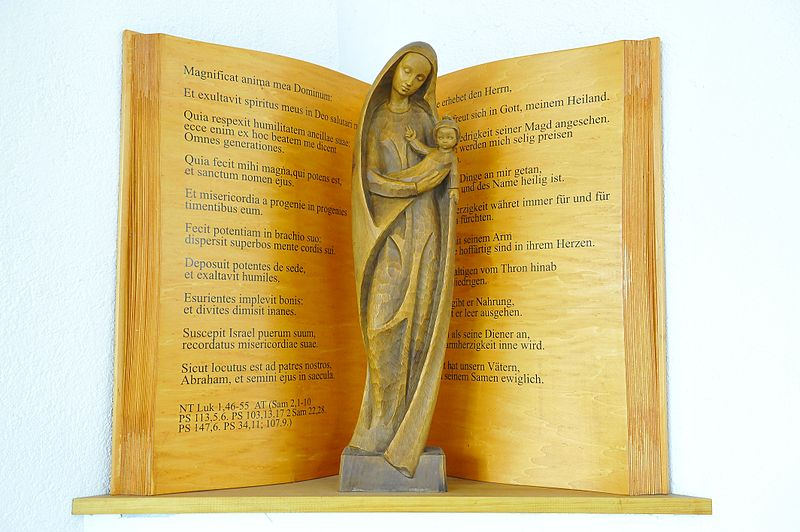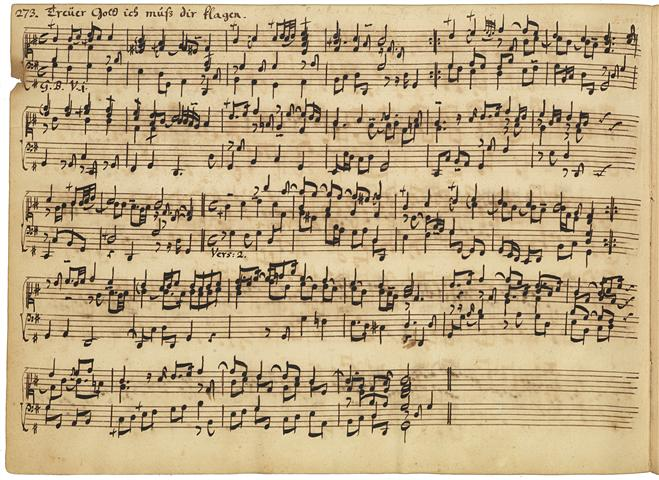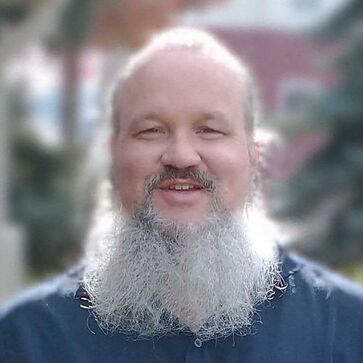|
The final composer in this month's Advent Baroque composer series will be Jean-Adam Guilain (c. 1680 -1739). Guilain was born in Germany but spent the majority of his life in France. Not much is known of him but his surviving musical output demonstrates an embracement of the French Classique tradition over the North German organ composition ethos. This Sunday morning, we'll hear excerpts from his singular collection of organ works entitled Pièces d'orgue pour le Magnificat sur les huit tons différents de l'église published in 1706. Each of the eight suites is based on the Gregorian Chant melody of the Magnificat in all eight church modes. The suites were intended to be sung in alternation with the chanted verses of the Magnificat and will be treated as such this Sunday morning with cantor Blair Carpenter, utilizing tone two.
Two other Marian works will be represented this Sunday morning as well. At 9:00 a.m., Blair Carpenter will sing Hugo Wolf's art song Nun, wandre Maria during the communion time. At the 11:00 a.m.service, the Chancel Choir will offer Ave, Ave, the Angel Sang, by prolific contemporary composer Robert Lau.
0 Comments
Johann Sebastian Bach (1685-1750) will be the organ music focus this Sunday morning as part of the Advent Baroque composer series. The four Advent works of the Orgelbüchlein ("Little Organ Book") will be offered. Composed mostly in Bach's Weimar period from 1708-1717, the collection contains 46 works representing the major feast days of the liturgical year, a small number completed of the 146 planned works. Bach describes the purpose of this collection in his foreword: "In which a beginning organist receives given instruction as to performing a chorale in a multitude of ways while achieving mastery in the study of the pedal, since in the chorales contained herein the pedal is treated entirely obbligato. In honour [sic] of our Lord alone. That my fellow man his skill may hone." The Orgelbüchlein was a pedagogical guide, study in compositional techniques and a religious statement. The four Advent works, BWV 599-602, are Nun komm, der Heiden Heiland (Come now Saviour of heathens), Gottes Sohn ist kommen (The Son of God is come), Herr Christ, der einge Gottes-Sohn (Lord Christ, the only Son of God), and Lob sei dem allmächtigen Gott (Praise be to God Almighty).
At the 11:00 a.m. service, the Chancel Choir will sing composer Robert Hobby's setting of the Charles Wesley Advent hymn, Come, Thou Long-Expected Jesus. The text is set to the tune JEFFERSON from the 1835 early American shape note and song book, Southern Harmony. Amy Welsh will conduct. At 6:00 p.m. the annual Longest Night service will include harpist Alaina Bongers, flutist Rebecca Quillen, the Plymouth Ringers, and our newest ensemble, the Chamber Choir. Advent selections include an arrangement of the 16th century plainsong chant Divinum Mysterium by Alaina Bongers and the Anglican choral classic A Spotless Rose by Herbert Howells. For each Sunday in the remainder of Advent, the seasonal chorale-based output of a Baroque composer will be focused upon from the organ.
This week, it will be German composer Georg Böhm (1661-1733). He is known as the father of the chorale partita, a composition which offers a succession of creative variations on a chorale tune. Excerpts from Freu dich sehr, o meine Seele (Rejoice greatly, O my soul) will be heard at the morning prelude and postlude and during the 9:00 a.m. service communion. The chorale melody is known to us as the Advent hymn Comfort, Comfort O My People, a tune compiled in the 16th century Genevan Psalter. The Chancel Choir will offer Felix Mendelssohn's How Lovely are the Messengers from the 1836 oratorio St. Paul. A paraphrase of Romans 10.15 & 18, the chorus praises the harbingers of peace on earth and the coming new kingdom of God on earth. At 6:00 p.m., Bobby, cantor Blair Carpenter, and bassist Peter Strening will lead us in song as we continue our Advent journey. |
Details
|




 RSS Feed
RSS Feed